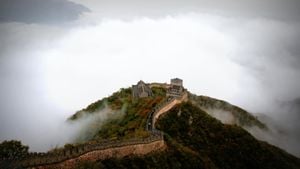Iran is poised to engage with European powers as it convenes discussions focused on its contentious nuclear program and pressing regional issues. This pivotal meeting will include deputy foreign ministers from Iran, the United Kingdom, France, and Germany, scheduled for November 29. The discussions are anticipated to address several themes, including the complex situation surrounding Palestine, the challenges faced by Lebanon, and the state of Iran's nuclear ambitions.
Foreign Ministry spokesman Esmail Baghaei announced this diplomatic development during a press briefing, emphasizing the importance of maintaining cooperative ties based on mutual respect and interests. The upcoming talks will build on previous discussions held during the recent United Nations General Assembly, highlighting Iran's commitment to open dialogue.
Baghaei described these negotiations as not merely procedural but rather as foundational to future regional stability. He stated, "A range of regional and international issues, including those concerning Palestine and Lebanon, as well as the nuclear issue, will be discussed." This commitment appears to signal Iran’s willingness to work with its European counterparts amid rising tensions.
Indeed, recent actions have underscored the delicate nature of these talks. Earlier this month, the International Atomic Energy Agency (IAEA) passed a resolution condemning Iran for its perceived lack of cooperation, prompting concerns from both sides about the impact this may have on upcoming discussions. The resolution was supported by the European trio, which has historically maintained significant leverage over Iran’s nuclear discussions.
This latest IAEA action coincides with Iran's announcement of new advancements, including the deployment of advanced centrifuges aimed at increasing its uranium enrichment capacity. Behrouz Kamalvandi, spokesman for Iran's Atomic Energy Organization, stated, "We will substantially increase enrichment capacity with the utilization of different types of advanced machines." While Iran asserts these measures are for peaceful purposes, skepticism persists globally about its true intentions.
The geopolitical backdrop to these discussions is equally fraught with tensions. Reports indicate widespread civilian casualties resulting from the conflict between Israel and Palestinian groups, with civilian death tolls spiraling as Israel continues its military operations. While these events occur, Iran has positioned itself as a vocal supporter of Palestinian rights, complicifying its relationship with European nations.
The stakes are high for Europe too, as they grapple with their commitments under the Joint Comprehensive Plan of Action (JCPOA), the landmark 2015 agreement aimed at curbing Iran's nuclear program. Since the United States, under former President Donald Trump, unilaterally withdrew from the agreement and reinstated heavy sanctions, the JCPOA has effectively crumbled. European nations have been struggling to maintain their commitments amid U.S. pressure and rising tensions within the region.
Iranian authorities assert their unwavering commitment to international agreements, even as they navigate the complicated realities of foreign pressure and internal expectations. Baghaei underscored Iran's stance: "Our principled policy of interaction and cooperation with other countries is based on the principles of honor, wisdom, and expediency." Yet, the increasing public discontent within Iran over the JCPOA’s limitations has prompted calls for reassessment of its nuclear policies, indicating significant political pressures domestically.
With tensions running high, outgoing IAEA resolutions and political maneuvering continue to shape the dialogue. Diplomatic efforts seek to counterbalance hardline stances, and both sides appear to be bracing themselves for negotiations fraught with stakes not just over nuclear capabilities but over broader regional stability. The capacity for dialogue could offer signs of hope for significantly more urgent issues at play.
Internationally, the dynamic is shifting. China and Russia continue to support Iran, offering alternative pathways and flexibility on UN sanctions, which may allow Iran some leeway amid stringent Western scrutiny. The interplay of global political forces surrounding the Iranian nuclear issue will be closely watched as the upcoming meeting nears.
The backdrop of these discussions highlights Iran's nuclear ambitions not just as technical achievements but as symbols of national sovereignty amid constrained geopolitics. How Iran navigates this fraught terrain with its historical adversaries could very well define its future interactions on the international stage.
On the eve of these negotiations, the world's focus remains on the broader implications of Iran's nuclear capabilities, regional conflicts, and the international response. The upcoming meeting promises to be another chapter in this complex narrative of diplomacy, power, and the quest for regional peace.



